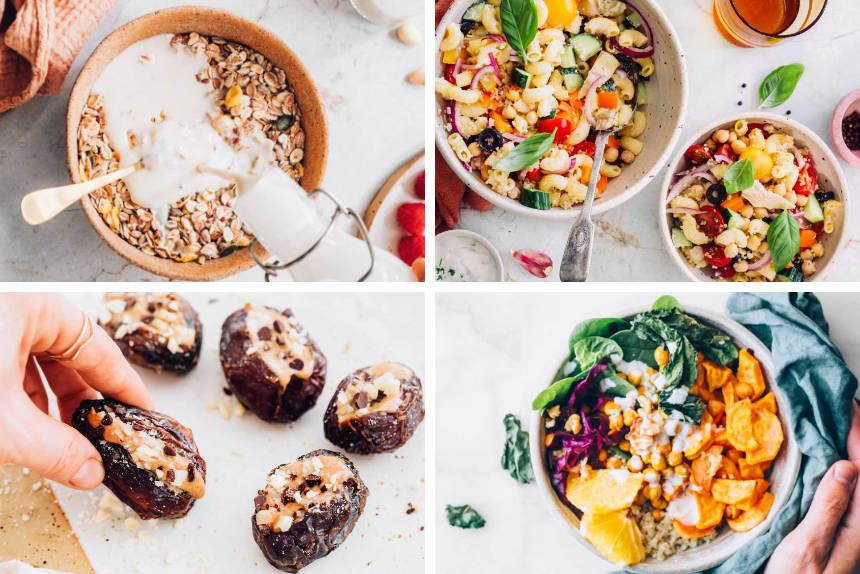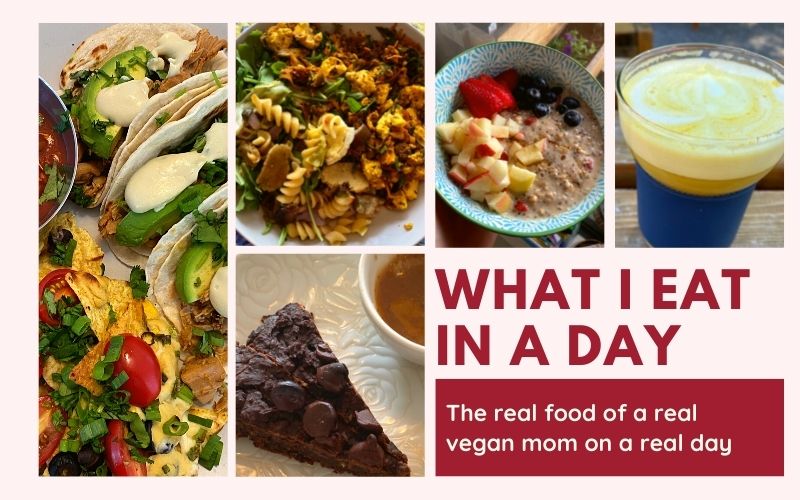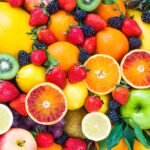Your trusted source for simple, practical nutrition advice and tips for a healthier lifestyle.
For a balanced vegan diet, eat fruits, vegetables, grains, nuts, seeds, and legumes daily. Include protein-rich foods like tofu and lentils.
Veganism promotes health and environmental benefits. A well-planned vegan diet ensures you get essential nutrients. Start your day with a hearty breakfast of oatmeal topped with fresh fruit and nuts. Enjoy a lunch of quinoa salad loaded with colorful vegetables.
Snack on hummus with carrot sticks or a handful of almonds. For dinner, savor a stir-fry with tofu, bell peppers, and broccoli over brown rice. Don’t forget to stay hydrated and incorporate a variety of foods to meet your nutritional needs. This approach ensures a delicious, nutritious, and fulfilling vegan lifestyle.
Introduction To Vegan Nutrition
Eating a vegan diet means consuming only plant-based foods. This includes fruits, vegetables, grains, nuts, and seeds. It excludes all animal products, such as meat, dairy, and eggs. Understanding vegan nutrition is important for balanced health.
Benefits Of A Vegan Diet
A vegan diet offers numerous benefits for health and well-being. Here are some key advantages:
- Improved Heart Health: Plant-based foods are low in cholesterol and saturated fats.
- Weight Management: Most vegan foods are lower in calories.
- Better Digestion: A high intake of fiber from fruits and vegetables aids digestion.
- Increased Energy Levels: Whole grains and nuts provide sustained energy.
Common Misconceptions
There are several misconceptions about vegan nutrition. Let’s address some of the most common ones:
- Vegans Lack Protein: Many plant foods are rich in protein. Examples include beans, lentils, and quinoa.
- Vegan Diets Are Expensive: Staples like rice, beans, and vegetables are affordable.
- Vegans Can’t Get Enough Vitamins: Vegans can get most vitamins from a varied diet. Supplements can help for specific needs.
Essential Nutrients For Vegans
Eating a balanced vegan diet is key to staying healthy. Getting the right nutrients helps your body function well. Let’s explore some essential nutrients for vegans.
Protein Sources
Protein is vital for building muscles and repairing tissues. Vegans can get protein from many plant-based sources. Here are some excellent options:
- Legumes: Beans, lentils, and chickpeas are rich in protein.
- Tofu and Tempeh: These soy products are versatile and protein-packed.
- Quinoa: This grain is a complete protein, containing all essential amino acids.
- Nuts and Seeds: Almonds, chia seeds, and hemp seeds are great for protein.
Vitamin B12
Vitamin B12 is crucial for nerve function and blood formation. Vegans should be mindful of this nutrient as it is mostly found in animal products. Here are some ways to get B12:
- Fortified Foods: Look for B12-fortified cereals, plant milks, and nutritional yeast.
- Supplements: B12 supplements are a reliable source for vegans.
Iron And Calcium
Iron is important for blood health, while calcium is needed for strong bones. Here are vegan sources for both:
| Nutrient | Sources |
|---|---|
| Iron | Spinach, lentils, quinoa, and fortified cereals |
| Calcium | Kale, broccoli, almonds, and fortified plant milks |
Omega-3 Fatty Acids
Omega-3s are essential for brain health. They also help reduce inflammation. Vegans can get Omega-3s from the following sources:
- Flaxseeds: Ground flaxseeds can be added to smoothies or oatmeal.
- Chia Seeds: These seeds are rich in Omega-3s and easy to use in recipes.
- Walnuts: A handful of walnuts can boost your Omega-3 intake.
- Algal Oil: This is a plant-based Omega-3 supplement derived from algae.
Breakfast Ideas
Starting your day with a nutritious vegan breakfast sets the tone for healthy eating. Here are some delicious and easy vegan breakfast ideas to kickstart your day.
Smoothie Bowls
Smoothie bowls are a fun way to enjoy your smoothies. They are thick enough to eat with a spoon and topped with various goodies.
- Ingredients: Use frozen bananas, berries, and spinach.
- Liquid Base: Add almond milk or coconut water.
- Blend: Mix until smooth.
Top with granola, chia seeds, and fresh fruit for extra nutrients.
Vegan Pancakes
Vegan pancakes are fluffy, delicious, and easy to make. You can enjoy them plain or with various toppings.
- Ingredients: Use flour, baking powder, and plant-based milk.
- Sugar: Add a bit of sugar or maple syrup.
- Mix: Combine the ingredients until smooth.
Cook on a non-stick pan until golden brown. Serve with berries and syrup.
Tofu Scramble
Tofu scramble is a great alternative to scrambled eggs. It’s packed with protein and easy to customize.
- Ingredients: Use firm tofu, turmeric, and nutritional yeast.
- Vegetables: Add bell peppers, onions, and spinach.
- Cook: Sauté vegetables, then add crumbled tofu and spices.
Serve with whole-grain toast or avocado slices for a complete meal.
Lunch Options
Finding delicious vegan lunch options can be a delightful culinary adventure. Whether you crave something light and fresh, or hearty and satisfying, there’s a vegan lunch option for you. Here are some tasty choices to consider.
Salad Recipes
Salads can be more than just leafy greens. They can be a vibrant mix of textures and flavors.
- Quinoa and Black Bean Salad: Quinoa, black beans, corn, and avocado, mixed with lime dressing.
- Chickpea Salad: Chickpeas, cucumber, tomatoes, and red onion, tossed with tahini dressing.
- Kale and Cranberry Salad: Kale, cranberries, almonds, and a tangy balsamic vinaigrette.
Hearty Soups
Soups can be a comforting and filling vegan lunch option. They are perfect for colder days.
| Soup Name | Ingredients | Description |
|---|---|---|
| Lentil Soup | Lentils, carrots, celery, onions, garlic, and tomatoes | A rich and protein-packed soup with savory spices. |
| Butternut Squash Soup | Butternut squash, apple, onion, and vegetable broth | A creamy and sweet soup, perfect for fall. |
| Minestrone | Beans, pasta, tomatoes, and mixed vegetables | A classic Italian vegetable soup with hearty beans and pasta. |
Buddha Bowls
Buddha bowls are colorful, nutrient-dense, and customizable. They are a great vegan lunch option.
- Grain Base: Choose from quinoa, brown rice, or farro.
- Protein: Add tofu, tempeh, or chickpeas.
- Veggies: Include a mix of roasted or raw veggies like broccoli, sweet potatoes, and spinach.
- Dressings: Top with tahini, soy sauce, or a lemon vinaigrette.
These bowls are easy to prepare and packed with nutrients.
Dinner Recipes
Discovering delicious vegan dinner recipes can be exciting. These recipes are tasty, nutritious, and easy to prepare. Let’s dive into some mouth-watering options for your vegan dinner.
Vegan Pasta
Vegan pasta is a versatile and satisfying dish. You can enjoy it with various sauces and vegetables.
- Ingredients:
- Whole wheat pasta
- Tomato sauce
- Olive oil
- Garlic
- Spinach
- Cherry tomatoes
- Salt and pepper
Instructions:
- Boil the pasta until al dente.
- Sauté garlic in olive oil.
- Add spinach and cherry tomatoes.
- Mix in tomato sauce, salt, and pepper.
- Toss the pasta with the sauce mixture.
- Serve hot and enjoy.
Stuffed Peppers
Stuffed peppers are a colorful and flavorful dinner option. They are packed with protein and vegetables.
- Ingredients:
- Bell peppers
- Quinoa
- Black beans
- Corn
- Tomato sauce
- Onion
- Garlic
- Spices (cumin, paprika)
Instructions:
- Cook quinoa as per package instructions.
- Sauté onion and garlic until soft.
- Add black beans, corn, and spices.
- Mix in cooked quinoa and tomato sauce.
- Stuff the mixture into bell peppers.
- Bake at 375°F for 25 minutes.
Veggie Stir-fry
Veggie stir-fry is a quick and healthy dinner choice. It is loaded with a variety of fresh vegetables.
- Ingredients:
- Broccoli
- Carrots
- Bell peppers
- Snap peas
- Soy sauce
- Ginger
- Garlic
- Olive oil
Instructions:
- Heat olive oil in a pan.
- Add garlic and ginger; sauté briefly.
- Stir in broccoli, carrots, and snap peas.
- Cook until vegetables are tender-crisp.
- Pour soy sauce over vegetables.
- Mix well and serve hot.

Credit: nutriciously.com
Snacks And Desserts
Snacks and desserts are essential in a vegan diet. They provide energy and satisfy sweet cravings. Here are some tasty options to consider.
Energy Balls
Energy balls are perfect for a quick, healthy snack. They are easy to make and packed with nutrients.
- Ingredients: Oats, dates, nuts, seeds, and cocoa powder.
- Preparation: Blend all ingredients. Roll into small balls.
- Storage: Keep in the fridge for up to a week.
Vegan Cookies
Vegan cookies are a delightful treat. They are free from dairy and eggs.
| Flavor | Ingredients | Baking Time |
|---|---|---|
| Chocolate Chip | Flour, sugar, vegan chocolate chips, coconut oil | 12 minutes |
| Oatmeal Raisin | Oats, raisins, maple syrup, almond butter | 10 minutes |
| Peanut Butter | Peanut butter, sugar, flour, baking soda | 15 minutes |
Fruit Sorbets
Fruit sorbets are refreshing and naturally sweet. They are also very easy to make.
- Choose Your Fruit: Mango, strawberry, or pineapple work well.
- Blend: Mix fruit with a bit of water.
- Freeze: Pour into a container and freeze for a few hours.
Enjoy these delicious and healthy vegan snacks and desserts!
Eating Out As A Vegan
Eating out as a vegan can be fun and delicious. With more vegan options available, you can enjoy meals without compromising your lifestyle. Whether you’re dining at a restaurant or grabbing fast food, there are plenty of choices to explore.
Restaurant Tips
Many restaurants now offer vegan options. Look for dishes marked with a vegan symbol. If unsure, ask the server about vegan choices.
- Choose places with a variety of plant-based dishes.
- Check the menu online before visiting.
- Request modifications to make a dish vegan.
- Ask for plant-based milk in coffee shops.
- Explore ethnic cuisines like Indian or Thai for vegan options.
Having these tips in mind ensures a pleasant dining experience.
Fast Food Choices
Fast food chains are offering more vegan options. You can find satisfying meals even on the go. Here are some popular choices:
| Chain | Vegan Options |
|---|---|
| Taco Bell | Bean Burrito (order Fresco), Veggie Power Bowl |
| Subway | Veggie Delight, Beyond Meatball Marinara |
| Chipotle | Sofritas Burrito, Veggie Bowl |
| McDonald’s | Side Salad, Apple Slices |
| Burger King | Impossible Whopper (no mayo), French Fries |
These options are tasty and quick. They make it easy to stick to your vegan diet even when you’re busy.

Credit: veganfamilykitchen.com
Supplementation
Eating a balanced vegan diet provides many nutrients. Still, some essential nutrients might be missed. This is where supplementation becomes important. Supplements ensure you get all the necessary vitamins and minerals. Proper supplementation supports your overall health and well-being.
When To Consider Supplements
Vegan diets can lack certain nutrients. These nutrients are often found in animal products. If you feel tired or weak, consider supplements. Pregnant women and children might need extra nutrients. Always consult a healthcare professional before starting any supplements.
Popular Vegan Supplements
Here are some popular vegan supplements that many people use:
- Vitamin B12: Crucial for nerve function and energy. Found in fortified foods or as a supplement.
- Vitamin D: Helps with calcium absorption and bone health. Available as D2 or vegan D3.
- Omega-3 Fatty Acids: Supports brain and heart health. Get it from algae oil supplements.
- Iron: Essential for blood health. Take iron with vitamin C for better absorption.
- Calcium: Important for bone strength. Often found in fortified plant milks or as a supplement.
- Zinc: Supports the immune system. Found in supplements or fortified foods.
Here is a table summarizing the key vegan supplements:
| Supplement | Importance | Common Sources |
|---|---|---|
| Vitamin B12 | Nerve function, energy | Fortified foods, supplements |
| Vitamin D | Calcium absorption, bone health | D2, vegan D3 |
| Omega-3 Fatty Acids | Brain and heart health | Algae oil supplements |
| Iron | Blood health | Supplements, fortified foods |
| Calcium | Bone strength | Fortified plant milks, supplements |
| Zinc | Immune system support | Supplements, fortified foods |
Conclusion And Tips
Ensuring a balanced vegan diet can be simple and enjoyable. With the right guidance, you can meet all your nutritional needs. Here are some tips to help you stay on track.
Maintaining A Balanced Diet
Balance is key in a vegan diet. Combine various food groups to get all essential nutrients.
| Food Group | Examples | Benefits |
|---|---|---|
| Proteins | Lentils, Chickpeas, Tofu | Builds muscles, repairs tissues |
| Carbohydrates | Quinoa, Sweet Potatoes, Oats | Provides energy |
| Fats | Avocado, Nuts, Olive Oil | Supports cell growth |
| Vitamins | Leafy Greens, Berries, Oranges | Boosts immunity |
Staying Motivated
Staying motivated on a vegan diet can be challenging, but it is possible.
- Set small, achievable goals.
- Join online vegan communities.
- Try new recipes each week.
- Track your progress with a food diary.
Keep in mind, variety is crucial. Experiment with different foods and flavors to keep your meals exciting.

Credit: www.youtube.com
Frequently Asked Questions
What Foods Should A Vegan Eat Daily?
Vegans should eat a variety of fruits, vegetables, whole grains, legumes, nuts, and seeds daily. Include sources of protein like tofu, tempeh, and lentils. Consume fortified foods or supplements for vitamin B12, D, and omega-3s. Drink plenty of water and eat balanced meals for optimal health.
How Much Should I Eat In A Day As A Vegan?
Aim for 1,800-2,400 calories daily based on activity level. Prioritize whole foods like vegetables, fruits, grains, and legumes.
What Does A Vegan Nutritionist Eat In A Day?
A vegan nutritionist typically eats fruits, vegetables, whole grains, legumes, nuts, and seeds. They prioritize balanced, nutrient-rich meals.
What Does A Day Of Vegan Eating Look Like?
A day of vegan eating includes oatmeal with fruits for breakfast, a quinoa salad for lunch, and a veggie stir-fry for dinner. Snacks might be nuts, fruit, or hummus with veggies.
Conclusion
Discovering what to eat in a day as a vegan is both rewarding and nutritious. Embrace diverse plant-based options for every meal. Prioritize whole foods for optimal health and energy. With mindful planning, a vegan diet can be delicious and satisfying.
Start your journey today and enjoy the benefits of vegan living.





